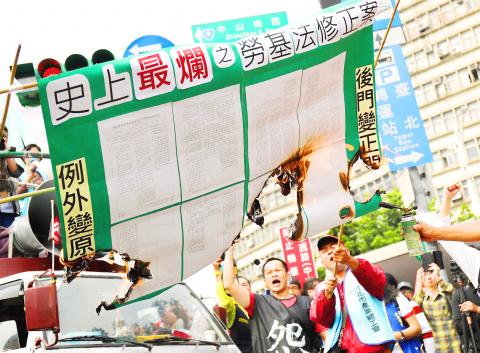Hundreds of workers and representatives of dozens of labor rights groups yesterday rallied in front of the Executive Yuan in Taipei to protest proposed amendments to the Labor Standards Act (勞動基準法), which they said would set back working conditions by 30 years.
The proposal is the “worst” piece of labor legislation as it would raise the ceiling on the number of consecutive working days from six to 12 days, while allowing industries to lower the minimum rest time between shifts from 11 hours to eight hours, they said.
The amendment runs counter to President Tsai Ing-wen’s (蔡英文) pledges to lower overall working hours while increasing salary levels, protesters said.

Photo: CNA
Medical Industries Union chairperson Chen Yu-feng (陳玉鳳) said medical professionals are regularly overworked and sleep-deprived as they are rarely allowed proper rest time between shifts, and the amendment would worsen their working conditions.
Sleep-deprivation is similar to being drunk and medical professionals who lack sleep would be taking care of patients in a state similar to intoxication, Chen said.
“As a doctor, Premier William Lai (賴清德) lacks medical ethics,” Chen said, calling Lai an “accomplice of capitalists” and demanding his resignation.
While the premier has proposed a series of policies aimed at solving industrial shortages, such as water and electricity, workers also have to face “shortages of health, dignity, rest, salary and union protection,” Solidarity Labor Union secretary-general Huang Yu-te (黃育德) said.
Kaohsiung City Confederation of Trade Union deputy director Chiang Chien-hsin (江健興) challenged Cabinet members’ statements that workers in central and southern Taiwan “like working overtime,” saying Taiwan’s average number of working hours already far surpass other countries.
Longer working hours do not necessarily translate into economic competitiveness, as Taiwan’s annual average working hours of 2,142 hours far exceed Japan’s 1,745 hours, Chinese Culture University law professor Chiu Chun-yen (邱駿彥) said.
The amendment, which will raise the maximum overtime hours from 46 to 54 per month, but caps the three-month total at 138, would provide a legal ground for employers to ask workers to work overtime for up to 54 hours for four months in a row, Chiu said.
While the amendment would allow for a one-year extension of unused annual leave, protesters said that employers should obtain the written consent of employees, amid fears that employers might use it as a legal excuse to prevent workers from taking leave.
Chinese Nationalist Party (KMT) Legislator Lin Wei-chou (林為洲) said the draft amendment is overbiased toward businesses and the party would oppose legislation that worsens working conditions.

Taiwan is stepping up plans to create self-sufficient supply chains for combat drones and increase foreign orders from the US to counter China’s numerical superiority, a defense official said on Saturday. Commenting on condition of anonymity, the official said the nation’s armed forces are in agreement with US Admiral Samuel Paparo’s assessment that Taiwan’s military must be prepared to turn the nation’s waters into a “hellscape” for the Chinese People’s Liberation Army (PLA). Paparo, the commander of the US Indo-Pacific Command, reiterated the concept during a Congressional hearing in Washington on Wednesday. He first coined the term in a security conference last

Prosecutors today declined to say who was questioned regarding alleged forgery on petitions to recall Democratic Progressive Party (DPP) legislators, after Chinese-language media earlier reported that members of the Chinese Nationalist Party (KMT) Youth League were brought in for questioning. The Ministry of Justice Investigation Bureau confirmed that two people had been questioned, but did not disclose any further information about the ongoing investigation. KMT Youth League members Lee Hsiao-liang (李孝亮) and Liu Szu-yin (劉思吟) — who are leading the effort to recall DPP caucus chief executive Rosalia Wu (吳思瑤) and Legislator Wu Pei-yi (吳沛憶) — both posted on Facebook saying: “I

The Ministry of Economic Affairs has fined Taobao NT$1.2 million (US$36,912) for advertisements that exceed its approved business scope, requiring the Chinese e-commerce platform to make corrections in the first half of this year or its license may be revoked. Lawmakers have called for stricter enforcement of Chinese e-commerce platforms and measures to prevent China from laundering its goods through Taiwan in response to US President Donald Trump’s heavy tariffs on China. The Legislative Yuan’s Finance Committee met today to discuss policies to prevent China from dumping goods in Taiwan, inviting government agencies to report. Democratic Progressive Party Legislator Kuo Kuo-wen (郭國文) said

The Ministry of Economic Affairs has fined Taobao NT$1.2 million (US$36,900) for advertisements that exceeded its approved business scope and ordered the Chinese e-commerce platform to make corrections in the first half of this year or its license would be revoked. Lawmakers have called for stricter supervision of Chinese e-commerce platforms and more stringent measures to prevent China from laundering its goods through Taiwan as US President Donald Trump’s administration cracks down on origin laundering. The legislature’s Finance Committee yesterday met to discuss policies to prevent China from dumping goods in Taiwan, inviting government agencies to report on the matter. Democratic Progressive Party